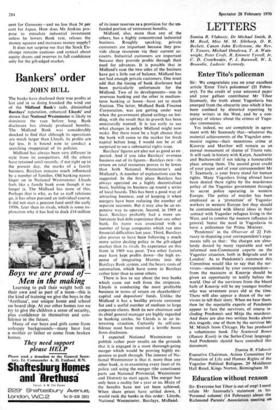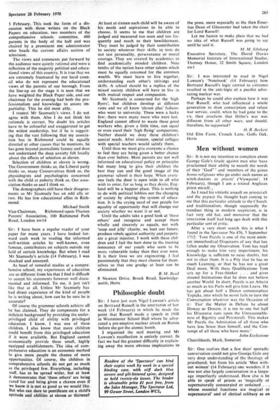Education without reason
Sir: Everyone but Tibor is out of step! I must refute Mr Szamuely's statement in his 'Personal column' (14 February) about the Richmond Parents' Association meeting on
3 February. This took the form of a dis- cussion with three writers on the Black Papers on education, two members of the comprehensive schools committee, 400 parents in the body of the hall and was chaired by a .prominent Bic administrator who heads the current affairs section of television.
The views and comments put forward by the audience were quietly rational and were a reflection of the majority political and educa- tional views of this country. It is true that we are extremely frustrated by our local coun- cil who do not represent the educational views of the parents of our borough. From the line-up on the stage it is seen that we have weighted the Black Paper side, and our chairman for the evening had both the pro- fessionalism and knowledge to assure im- partiality. This he did most ably.
I respect Mr Szamuely's views. I do not agree with them. AlSo I do not think his rationale is correct. No doubt his articles have to be colourful and exaggerated to get the widest readership, but if he is suggest- ing that the vast following that my associa- tion has in Richmond could be equally directed at other causes that he mentions, he has gone beyond journalistic licence and does not understand the deep anxiety felt locally about the effects of selection at eleven.
Selection of children at eleven is wrong. The Government thinks so, the Liberal party thinks so, many Conservatives think so, the physiologists and psychologists concerned with the child at puberty think so. Our asso- ciation thinks so and I think so.
The demographers still have their disagree- ments so Mr Szamuely has an odd ally or two. He has few educational allies in Rich- mond.
Michael Smith Vice-Chairman, Richmond-upon-Thames Parents' Association, 100 Richmond Park Road, London sw14
Sir: I have been a regular reader of your paper for many years. I have looked for- ward each week to reading the informed well-written articles by well-known, even famous, contributors on subjects outside my field of certain knowledge. But when I read Mr Szamuely's article (14 February), I was shocked and annoyed.
As head of remedial studies at a compre- hensive school, my experiences of education are so different from his that I find it difficult to accept his statements however well docu- mented and informed. To me, it just isn't like that at all Unless Mr Szamuely has had direct experience of the kind of people he is writing about, how can he be sure he is accurate?
Of course the grammar schools achieve all he has claimed. They do compensate for a deficient background by providing the under- privileged child of ability with privileged education. I know, I was one of these children. I also know that more children could benefit from this privileged education if it were available. But England cannot economically provide these small, highly equipped establishments. The idea of com- prehensive education is an economic method to give more people the chance of more opportunities. Of course, the children in comprehensive schools do not get as much as the privileged few. Everything, including staff, has to be spread wider, but at least it demonstrates that 'these others' are being cared' for and being given a chance even if we know it is not as good as we would like. But who can dare to pontificate on a child's aptitude and abilities at eleven or thirteen? At least at sixteen each child will be aware of his needs and aspirations to be able to choose. It seems to me that children are judged and measured too soon and too fre- quently and much to their bewilderment. They must be judged by their contribution to society whatever their skills. IQ tests do not test personality, perseverance or moral courage. They are created by academics to find academically minded children. Nine tenths of the nation have other talents which must be equally esteemed for the common wealth. We must learn to live together, understanding each other's strivings and skills. A school should be a replica of the mixed society children will have to live in with mutual respect and compassion.
Mr Szamuely is concerned for the 'high flyers', but children develop at different rates and we all know 'eleven plus' failures who went to university. These were a lucky few; there were many more who were lost. England cannot afford to waste these good workers who, given a little time, can equal or even excel their 'high flying' companions. Neither should we deny these children's special needs. After sixteen, special colleges with special teachers would satisfy them.
Until then we must give everyone a chance to feel they are being given a better chance than ever before. Most parents are not well informed on educational policy or principles but many long to give their children the best they can and the good image of the grammar school is their hope. When every- one feels the door is open wide to all who wish to enter, for as long as they desire, Eng- land will be a happier place. This is nothing to do with political lobbies nor the changing of society by altering the system of educa- tion. It is the crying need of our people for equality of opportunity that will change our society whether we want it or not.
Until the adults take a good look at 'these others' and recognise and accept them wholly and sincerely as equals, not with 'soup and jelly' charity, we hurt our future, produce rebels against authority and perpetu- ate a great injustice. I work with these chil- dren and I feel the hurt done to the trusting innocence of our youth who seem to be more vulnerable today than they ever were. It is their lives we are engineering. I feel passionately that they must choose for them- selves so that one grudge at least can be eliminated.
B. M. Reed 9 Newton Drive, Brook Road, Sawbridge- north, Herts



































 Previous page
Previous page